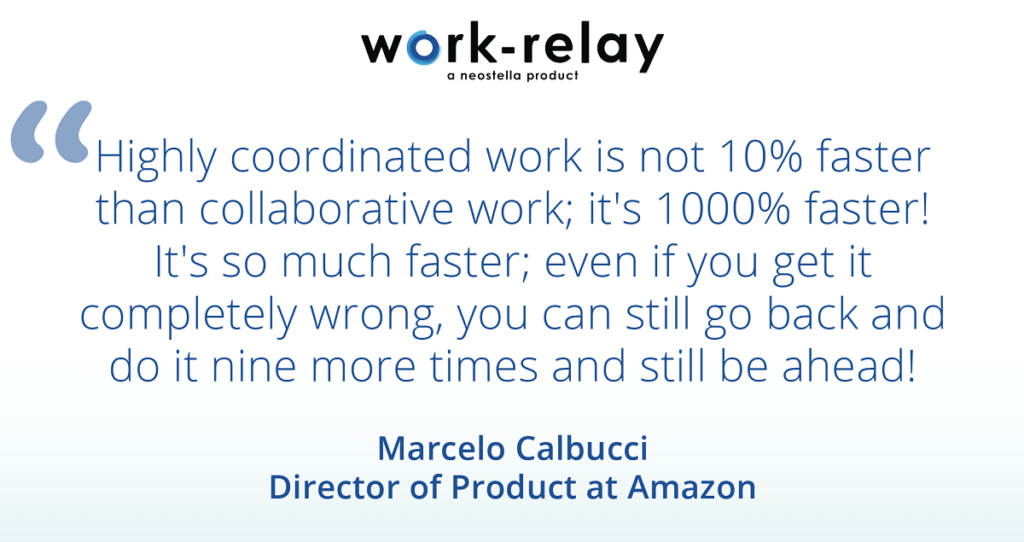Coordination vs. Collaboration
Learn the difference between coordination vs collaboration, and how coordination leads to successful completion and acceleration of work.

Coordination in essential operations such as Quote-to-Cash leads to successful completion and acceleration of work.

Collaboration vs Coordination
The difference between collaboration vs coordination can be viewed like this:
Collaboration = Working together to achieve an activity goal together.
Coordination = Working separately to achieve an activity goal together.
Both involve a group of people trying to achieve a result, and both are about each person contributing by doing tasks. But for repetitive work, using collaboration instead of coordination slows things down.
The majority of activity that takes place in collaboration tools when used in a process like QtC can be eliminated by streamlined, disciplined, and focused coordination.
Why is Collaboration Inefficient?
Collaboration makes people feel good and part of creating something meaningful. But collaboration in repetitive work like QtC is one of the biggest bottlenecks in business. You cannot scale a team, a project, or a company with more collaboration.
In fact, we want teams to collaborate a little but then go off an execute (or manage the execution) in a one:many model where the “many” are the actual units of work getting executed.
In certain knowledge work, collaboration is important, such as ideating on a marketing launch or a new product idea. But in mission-critical operations across most companies, the collaboration is a fraction of the real need around coordination.
Downsides of collaborative work vs coordinated work include:
- Slower work process
- Lack of ownership and accountability
- Requires presence
- Hard to measure and improve
- Leads to more meetings, email chains, and Slack channels
- Delayed decision-making and action
How Coordination Improves Processes
Coordination is the key to faster and more efficient work. Coordination means that everyone works on their part, and they know how their work fits together. They do not block each other, and they do not depend on each other to work simultaneously. It prompts questions like:
- What’s preventing us from doing our tasks asynchronously and independently?
- What’s stopping us from trusting each other or codifying the work?
- How do we enforce dependencies and ensure smooth work transitions—without the need for collaboration?
Highly coordinated work is much faster than collaborative work, and it is essential to figure out how to convert more work streams from collaboration to coordination. Teams should focus on working asynchronously and independently, trusting each other, and codifying work to ensure accountability and clarity.
Accelerating Quote-to-Cash Through Coordination
Across virtually every industry, The Quote-to-Cash (QtC) process is mission critical and provides extensive bottom line returns when done right. In fact, McKinsey estimates that improving the quote-to-cash process could help trim end-to-end costs by 15 to 20 percent. Yet many companies are not focusing on this key area because of the complexity of improving this operation.
In general, meeting efficiency goals requires extensive streamlining of the QtC operation. Many times, this is where collaboration tools like Slack are used to paper over problems in the process including:
- Poor work transitions
- Lack of real-time visibility over the status of work
- Missed dependencies
- Overcoming constraints
- Inadequate data
- Lack of standardization, discipline, and focus
Coordination applications ensure the right work is done in the right sequence by the right resource at the right time, thereby eliminating these types of problems and, hence, removing the need for unnecessary communication and collaborations in quote-to-cash that slow work down.
How Can Work-Relay Help?
Coordination of the most complex and time-sensitive repetitive operations can be achieved quickly and easily using Work-Relay. Work-Relay provides the framework you need to get coordination right by ensuring the right work in the right sequence gets to the right resource at the right time, thereby eliminating the need for unnecessary communication and collaboration. Ultimately, better coordination (not collaboration) leads to the acceleration and successful completion of work.
